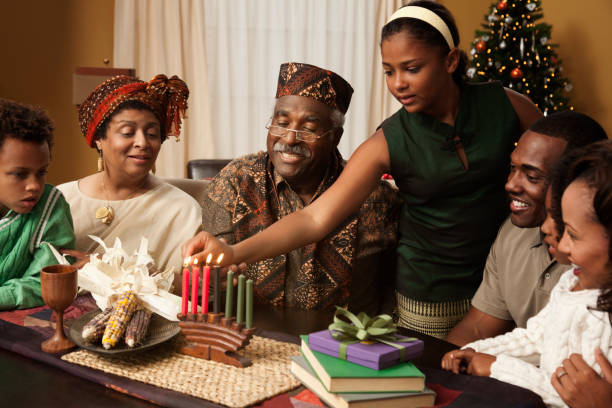
Dr. Maulana Karenga, professor and head of African Studies at California State University, Long Beach, founded Kwanzaa as an African-American holiday in 1966.
Kwanzaa is observed from December 26 to January 1.
Karenga's initial idea was to offer Black Americans a time to reflect on Africa's cultural history and values as an alternative to Christmas.
Karenga took inspiration for the seven "Nguzo Saba," or principles of African ancestry, from various African harvest celebrations, Black Nationalist philosophy, and other cultural influences. Each of these ideas has its own tangible sign, one for each day of Kwanzaa.
The Black community has struggled to build a cultural identity, so if you're wondering whether to celebrate Kwanzaa, dedicating a few days of the year to African history and fostering a feeling of belonging to the past may be beneficial.
Christmas and Kwanzaa May Both Be Celebrated
Christmas and Kwanzaa are not incompatible.
Karenga envisioned Kwanzaa as a nonreligious festival for African-American families to gather and commemorate their ancestors. So you may have a Merry Christmas as well as a Happy Kwanzaa.
It's OK to Be Eager About the Feast
If you didn't like your Christmas feast, Kwanzaa gives you a second chance.
On December 31, Kwanzaa celebrants gather for a pan-African feast known as Karamu Ya Imani (Feast of Faith), with everything from Ghanaian stew and jollof rice to jerk chicken, catfish, and collard greens. It generally consists of many phases, including a greeting, memory, celebrating, and departure.
RELATED: Kwanzaa: What It Really Is And How & Why It’s Celebrated
A Worldwide Celebration?
Kwanzaa is a holiday where every day has a concept, and you light a candle in your family house. Then you're expected to hold a great feast with the whole family and community.
Now that Juneteenth (June 19) is a federal holiday — one with particular meaning for Blacks, but one that all people are urged to observe — it may be time to consider if there is anything universal about Kwanzaa. Something we can all be proud of, regardless of our origin.
Everything is founded on seven universal principles.
Every individual should have a vision, choosing where they want to go, what they want to learn, and where they want to be successful.
Kwanzaa is about keeping your community together and having a positive view of life.
Is there harmony in your family? Are you self-assured? That is not limited to Black Americans. Everyone needs it.
Kwanzaa Makes No Distinctions
It's clear that Kwanzaa is a holiday designed for African-Americans.
However, other races and ethnic groups are permitted to join Kwanzaa festivities, as individuals other than Mexicans celebrate Cinco de Mayo.
Kwanzaa is not a substitute for Christmas; rather, it is a supplement to it.
Despite not commemorating the holiday, former President Barack Obama and his wife, Michelle, released a statement in 2011 in which they expressed their gratitude "to all those celebrating Kwanzaa."
"We recognize that there are still far too many Americans who are struggling to make ends meet," the president added. "But we also know that by working together in the spirit of Umoja, or oneness, we can overcome those problems."
Presidents Bill Clinton and George W. Bush issued similar declarations during their tenures.
The festival has also gained traction with the United States Postal Service, which has produced Kwanzaa stamps since 1997.
Conclusion
We must stay unified.
People may have their own politics. Everyone has their own set of views. But there's still a way for us to respect each other and have togetherness. No matter what, we must maintain communal togetherness.
So, you want to observe Kwanzaa? If you were not raised with it, seek out others familiar with it. Try attending a municipal event or a library program in your community. Happy holidays!









